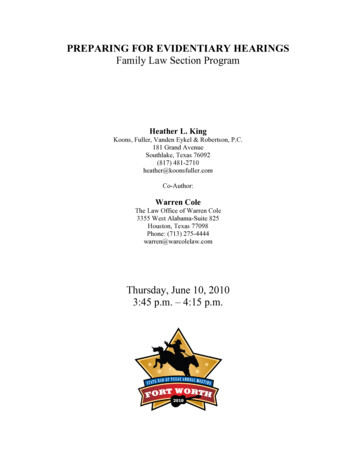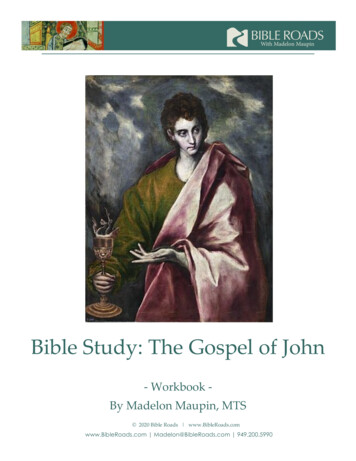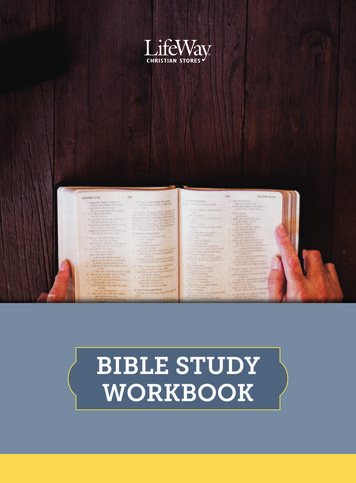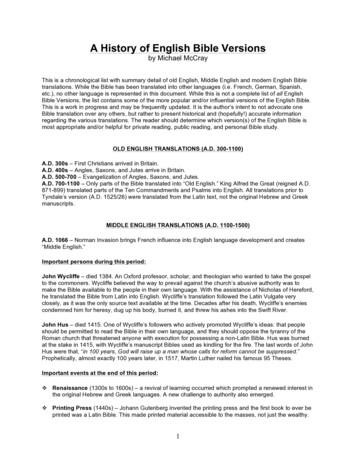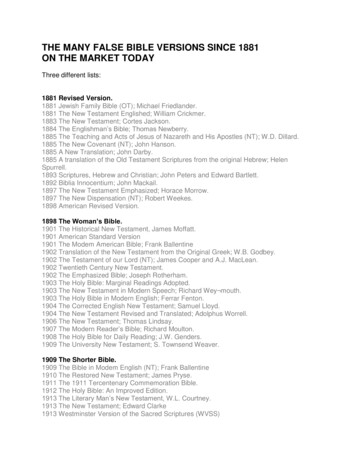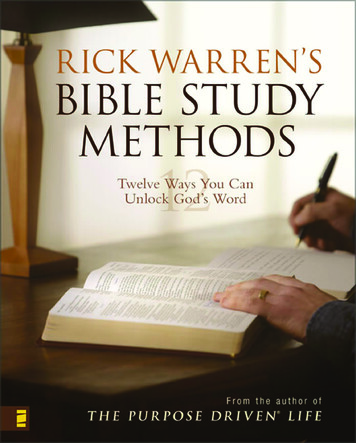
Transcription
RICK WARREN’SBIBLE STUDYMETHODS0310273005 warrenmethods.indd 16/30/08 2:19:57 PM
Also by Rick WarrenThe Purpose Driven LifeThe Purpose Driven ChurchLiving with Purpose SeriesGod's Answers to Life's Difficult QuestionsGod's Power to Change Your Life0310273005 warrenmethods.indd 26/30/08 2:19:57 PM
RICK WARREN’SBIBLE STUDYMETHODS12Twelve Ways You CanUnlock God’s WordFrom the author of THE PUR POSE DR I V EN LIFE0310273005 warrenmethods.indd 36/30/08 2:19:57 PM
Rick Warren’s Bible Study MethodsCopyright 1981, 2006 by Rick WarrenFormerly published under the title Personal Bible Study MethodsRequests for information should be addressed to:Zondervan, Grand Rapids, Michigan 49530Library of Congress Cataloging-in-Publication DataWarren, Richard.Rick Warren’s Bible study methods : Twelve ways you can unlock God’s Word / Rick Warren.p. cm.ISBN 978-0-310-27300-41. Bible — Study and teaching. I. Title.BS600.3.W37 2006220.071 – dc222005037198All Scripture quotations, unless otherwise indicated, are taken from the Holy Bible: New International Version . NIV .Copyright 1973, 1978, 1984 by International Bible Society. Used by permission of Zondervan. All rights reserved.KJV indicates Scripture quotations from the King James Version.The website addresses recommended throughout this book are offered as a resource. These websites are notintended in any way to be or imply an endorsement on the part of Zondervan, nor do we vouch for their content forthe life of this book.All rights reserved. Some forms are designated in the text as being suitable for reproduction. No other part of thispublication may be reproduced, stored in a retrieval system, or transmitted in any form or by any means — electronic,mechanical, photocopy, recording, or any other — except for brief quotations in printed reviews, without the priorpermission of the publisher.Interior design by Mark SheeresPrinted in the United States of America08 09 10 11 12 13 14 15 16 17 18 20 19 18 17 16 15 14 13 12 11 10 9 8 7 6 50310273005 warrenmethods.indd 46/30/08 2:19:57 PM
To my wife, Elizabeth Kaywhose prayers, support, and commitment to disciple-making have beena constant encouragement while I was working on this book.She is truly a gift from God.0310273005 warrenmethods.indd 56/30/08 2:19:57 PM
CONTENTSPreface . . . . . . . . . . . . . . . . . . . . . . . . . . . . . . . . . . . . . . . . . . . . . . . . . . . . . 9Introduction: How to Study the Bible . . . . . . . . . . . . . . . . . . . . . . . . . . . . . . 15Preview of the 12 Bible Study Methods . . . . . . . . . . . . . . . . . . . . . . . . . . . . 301.2.3.4.5.6.7.8.9.10.11.12.The Devotional Method of Bible Study . . . . . . . . . . . . . . . . . . . 33The Chapter Summary Method of Bible Study . . . . . . . . . . . . . 49The Character Quality Method of Bible Study . . . . . . . . . . . . . . 61The Thematic Method of Bible Study . . . . . . . . . . . . . . . . . . . . 79The Biographical Method of Bible Study. . . . . . . . . . . . . . . . . . 97The Topical Method of Bible Study. . . . . . . . . . . . . . . . . . . . . 115The Word Study Method of Bible Study . . . . . . . . . . . . . . . . . 133The Book Background Method of Bible Study . . . . . . . . . . . . 151The Book Survey Method of Bible Study . . . . . . . . . . . . . . . . 169The Chapter Analysis Method of Bible Study . . . . . . . . . . . . . 189The Book Synthesis Method of Bible Study . . . . . . . . . . . . . . 207The Verse-by-Verse Analysis Method of Bible Study. . . . . . . . 221AppendicesA.B.C.D.E.F.G.How to Have a Meaningful Quiet Time . . . . . . . . . . . . . . . . . . 231General Questions for a Biographical Study . . . . . . . . . . . . . . 255A List of Positive and Negative Character Qualities. . . . . . . . . 259A Partial List of Biblical People . . . . . . . . . . . . . . . . . . . . . . . 262A Suggested List of Key Words for Study . . . . . . . . . . . . . . . . 264What to Look for in a Chapter Analysis Study. . . . . . . . . . . . . 265A Plan for Studying the Bible Systematically . . . . . . . . . . . . . 267For Further Reading . . . . . . . . . . . . . . . . . . . . . . . . . . . . . . . . . . . . . . . . . 2710310273005 warrenmethods.indd 76/30/08 2:19:57 PM
PREFACEFor many years every time I heard a good sermon or some in-depth Bible teaching,I would leave the meeting frustrated, wondering to myself, How did he find all ofthat in his text? I wanted to be able to discover those truths on my own. In addition,I often felt guilty because people were always telling me I ought to study the Bible,but when I tried to study it, I didn’t know what to do. So I would get discouragedand give up.Since those days of frustration, I have discovered that most Christians sincerely want to study their Bibles on their own, but they just don’t know how. Theydon’t need more exhortation (“You ought to study your Bible!”); they just needsome instruction on how to study the Word of God. And that is the purpose of thisbook — it is a “how-to” manual on Bible study. It assumes that you already knowthe importance of personal Bible study, that you have been exhorted many times tothis Christian duty, and that you have been waiting for someone to show you howto do it.The Bible teaches us that we cannot be disciples of Jesus Christ if we do nothave a regular intake of the Word of God. On one occasion Jesus said to his followers, “If you continue in my word, then are you my disciples indeed; and youshall know the truth, and the truth shall make you free” (John 8:31 – 32 KJV). Aswe look back through the history of the Christian church, we find that the commondenominator of every great man and woman of God is that they knew the Scriptures and spent consistent, regular time with the Lord in his Word.Never before in history has the Bible been more available to the Western world.Yet never before has there been such a famine of God’s Word. We have Bibles inhotels, motels, doctors’ offices, libraries, and most homes in America, yet mostpeople are ignorant of what the Scriptures have to say. We live in a day of biblicalilliteracy, even among many people of God.90310273005 warrenmethods.indd 96/30/08 2:19:58 PM
RICK WARREN’S BIBLE STUDY METHODSEach study method in this book is presented in such a way that any believersin Christ can follow the steps suggested and be able on their own to get somethingout of their study of the Scriptures. I trust that your reading, study, and use of thisbook will make you into a biblically literate disciple of the Lord Jesus Christ — useful as a worker in your local church in reaching the lost with the gospel and trainingbelievers in discipleship.The claims of discipleship include a call to commitment by men and womenwho want to follow Jesus. They grow as disciples by getting into the Word as ahabit of life and applying it consistently to their daily lives.George Mueller, the director of a series of orphanages in Bristol, England, during much of the 19th century, was known as a man of faith and prayer. It is amazing to read the answers to prayer this man had during his long life. What made hima man of faith and prayer? During his lifetime he read through the Bible over 200times, and more than half of those readings he did on his knees, praying over theWord and studying it diligently.When you know the Word of God that well, you are going to know the will ofGod for your life. When you know the will of God, you will be able to pray specificallyand get specific answers.If we were to ask in a church meeting, “How many of you believe the Biblefrom cover to cover?” probably everyone would raise a hand. However, if we wereto ask, “How many of you read it regularly from cover to cover?” we might notget much of a response. It seems we are often guilty of being more interested indefending God’s Word than in studying it.On a typical evening an average Christian may sit and watch TV for three hours,but only read his Bible for three minutes before bedtime. Is it any wonder manylack spiritual maturity? Many Christians are more faithful to the Dear Abby columnor the sports pages than they are to the Word of God. I have known non-Christianswho would not leave their homes in the morning until they had read their horoscopes. What would happen if Christians committed themselves with equal vigor toreading their Bibles each morning before they left for work, school, or shopping? Itwould change their lives and the lives of those around them.100310273005 warrenmethods.indd 106/30/08 2:19:58 PM
PrefaceThe apostle Paul said something important about the Scriptures. Writing toTimothy, he declared:But as for you, continue in what you have learned and have become convinced of,because you know those from whom you learned it, and how from infancy you haveknown the holy Scriptures, which are able to make you wise for salvation through faith inChrist Jesus. All Scripture is God-breathed and is useful for teaching, rebuking, correcting, and training in righteousness, so that the man of God may be thoroughly equippedfor every good work (2 Tim. 3:14 – 17).Paul gives us two reasons why we should know the Scriptures. The first purpose is that we might come to know Jesus Christ and receive his salvation (v. 15).We learn about him and redemption through the Word. The second purpose ofScripture is to help us grow spiritually that we might be equipped for whateverGod wants us to do (v. 17). The means to that growth are teaching (doctrine),rebuking, correcting, and training (v. 16). Teaching shows us the path on whichwe are to walk; rebuking shows us where we got off the path; correcting tells ushow to get back on the path; and training in righteousness teaches how to stayon that path. This means that the Bible is the comprehensive guidebook for livingthe Christian life.Near the end of Jesus’ ministry, the Jewish leaders were trying to trick himwith complicated questions about their Law. To one question the Sadducees haddesigned to try to trap him, Jesus replied, “You are in error because you do notknow the Scriptures or the power of God” (Matt. 22:29). Jesus gives here the twobasic reasons for false doctrine, or error. People get off base doctrinally becausethey know neither their Bibles nor the power of God. All error comes from thesetwo things.With the current rise and popularity of cults, false teachings, and nonbiblicalphilosophies, it is imperative that we Christians be grounded in the Word of God sothat we can discern error from truth.Why is it that most Christians do not study the Word of God? Probably manyreasons could be given, but three seem to be most common. The first reason is thatpeople don’t know how. This was my situation for many years. I would go to a Bible110310273005 warrenmethods.indd 116/30/08 2:19:58 PM
RICK WARREN’S BIBLE STUDY METHODSconference, retreat, or revival and hear great preaching. I would often leave themeeting amazed at the scriptural insight the various speakers possessed. Then Iwould think, Why didn’t I see that? and I would try to study on my own. But becauseno one had shown me how to study the Bible by myself, I was unable to do it andfelt frustrated. I knew God wanted me to study his Word, so I committed myself tolearning how and to teaching others how it could be done.If I were to meet a starving man by the side of a river, lake, or ocean, I coulddo one of two things: I could get my fishing rod and catch him a fish, thus satisfying his hunger for a few hours; or I could teach him how to fish, thus satisfying hishunger for his lifetime. The second option is obviously the best way to help thatman. In the same way, hungry Christians need to be taught how to feed themselvesfrom the Word of God.The second reason why people don’t study their Bibles is that they are notmotivated. This is because they have not experienced the joy that comes from personally discovering truths from the Word of God. Past efforts at Bible study havebeen unfruitful, so they have given up. They have become satisfied with getting allthey need for their Christian lives from somebody else rather than finding it out ontheir own. At this point, I must warn you about this book: If you get serious aboutstudying the Bible on your own, you will never again be satisfied with a mere secondhand knowledge of the Scriptures. Dr. Paul Little once compared personal Biblestudy to eating peanuts. Once you get started doing it, you’re hooked! When youdiscover how good Bible study “tastes,” you will find yourself going back for moreand more. Personal Bible study can be habit-forming!The third reason why people don’t study the Scriptures is that they are lazy.Bible study is hard work, and there are no shortcuts to it. It is just like anything elsein life that is truly worthwhile: it takes time, effort, concentration, and persistence.Most great truths of the Word of God do not lie on the surface; we have to dig forthem. Just as gold might be found at the bottom of a mine or a pearl at the bottomof the sea, so the deeper truths of God must be searched out with great diligence.Howard G. Hendricks, well-known conference speaker and Christian educationexpert, has spoken of three stages of attitudes toward Bible study:120310273005 warrenmethods.indd 126/30/08 2:19:58 PM
Preface The “castor oil” stage — when we study the Bible because we know it isgood for us, but it is not too enjoyable. The “cereal” stage — when our Bible study is dry and uninteresting, butwe know it is nourishing. The “peaches and cream” stage — when we are really feasting on theWord of God.In the Western world we live in a society that prefers to have other people doour thinking for us. That’s why TV and other forms of entertainment, includingprofessional sports, are so popular. We want to relax and be entertained withouthaving to think or exert any effort. In Bible study, however, we have to learn sometechniques, some methods, and then concentrate on digging out the messagesGod has for us.The purpose of this book is to teach you how to dig out the riches of the Wordof God for yourself. It will require some serious thinking, but we have tried to keepthe procedures simple.In each chapter you will be introduced to one of 12 basic methods of personalBible study. For the sake of clarity, each chapter contains the same basic components, though the order varies:1. A condensed outline of each method. This allows you to gain an overviewof each method at a glance. You will find this helpful whenever you needto refer back to the sequence of steps in a certain method.2. A short definition of the method.3. A rationale for each method. This acquaints you with the benefits andlimitations of each method.4. The procedure for each method. This is explained in a simple step-bystep manner.5. An example of each method (a completed form).6. A blank form you can use or copy for your own study.7. Suggested possible passages or subjects to get you started on your ownstudy.8. Suggestions for further reading related to each method.130310273005 warrenmethods.indd 136/30/08 2:19:58 PM
RICK WARREN’S BIBLE STUDY METHODSBecause each chapter is independent of the others, you may skip around inreading the book, choosing to learn first the methods that interest you most. However, with the exception of the last one, these methods are presented in order oftheir difficulty. There is a logical progression through the book. As you move fromchapter to chapter, you will be introduced to additional Bible study skills. For thebest results, you should master each method in the order given before proceedingto the next. Chapter 1, “The Devotional Method,” is foundational; you should readand understand it before attempting any other method. It will teach you how towrite out a personal application from Scripture, which you will then use as a finalstep in most of the other methods.I trust that this book will become a well-worn and used reference tool that willguide you in a lifetime of personal Bible study and in your teaching others to do thesame.140310273005 warrenmethods.indd 146/30/08 2:19:58 PM
INTRODUCTION:HOW TO STUDY THE BIBLEPRINCIPLES OF DYNAMIC BIBLE STUDYDynamic Bible study does not require anything magical. Once you understand thebasic principles, it is simple to do. Here are five general principles you will need toremember, regardless of the method of study you use.1. The secret of dynamic Bible study is knowing how to ask the right kinds ofquestions. The twelve methods of Bible study presented in this book require yourasking questions of the biblical text. The main difference in these methods is thetypes of questions you will ask. You will have different types of questions with eachmethod. Asking questions is a skill that you can develop. As you grow in proficiencyin Bible study, you will develop the art of asking questions. The more questions youask about the text under study, the more you will get out of it.You will realize that you can bombard the text with a limitless number of questions. One benefit of studying the Bible is that you will begin developing a moreinquisitive mind. You will discover exciting insights you’ve overlooked in the past. Itwill seem as if you have been given a new pair of eyes! Suddenly, every time youpick up the Bible to study, new truths will leap out of the text.2. Dynamic Bible study involves writing down what you have observed anddiscovered. You haven’t really thought through a biblical text until you have put thethoughts gained from it into writing. You cannot study the Bible without writingsomething down. That is the difference between Bible reading and Bible study. Inreading the Bible you simply read through a selected portion of Scripture, whereasin studying the Bible you take extensive notes. Dawson Trotman, founder of theNavigators, used to say, “Thoughts disentangle themselves when they pass through150310273005 warrenmethods.indd 156/30/08 2:19:58 PM
RICK WARREN’S BIBLE STUDY METHODSthe lips and the fingertips.” If you haven’t put your observations down on paper, youhaven’t really thought about them.This principle is true not only in Bible study but also in many other areas ofthe Christian life. One of the most profitable things you can do in your spiritual lifeis to start some kind of spiritual notebook in which you write down thoughts andinsights God has given you.Nowhere is note-taking more important than in your personal Bible study. If youreally value the nuggets of truth that you discover, you will take notes on everythingyou dig out of the Scriptures. Even if you don’t see anything in a particular verse,write that down. Each Bible study method in this book has a study form designedto be used with it so that you can write down various notes on what you study.3. The ultimate goal of dynamic Bible study is application, not just interpretation.We do not want to settle for understanding alone; we want to apply the biblical principles to our daily living. Dwight L. Moody, a great evangelist and Christian educatorof the late nineteenth century, used to say, “The Bible was not given to increase ourknowledge, but to change our lives.” It was given to change our character and bringit more into conformity with Jesus Christ. All of our efforts in Bible study are valueless if in the final analysis we do not change and become more like Jesus. We must“not merely listen to the word,” but we are to “do what it says” (James 1:22).It is possible to know the Word of God and not know the God of the Word. Oneof the tragedies of our time is that some of the world’s best Bible scholars are alsosome of the poorest soul-winners. They have the time to dig for great gems of biblical truth, but they seem to forget that one of the mandates of Scripture is to go outand make disciples. When we apply God’s Word in our lives, we will also becomeeager to carry out the Great Commission (Matt. 28:18 – 20).One day a man asked me, “What is the best translation?” (He was referring, ofcourse, to the best Bible version.)I answered, “The best translation is when you translate the Word of God intoyour daily life.”He said, “But I’ve got my Living Bible.” (He still didn’t get the picture.)I replied, “You ought to be a living Bible! The Word made flesh ought to be visible in your life.”160310273005 warrenmethods.indd 166/30/08 2:19:58 PM
Introduction: How to Study the BibleSome of the questions you ought to be asking yourself in your Bible studyare: What attitude do I need to change as a result of this study? What do I need tostart doing or stop doing? What things do I need to believe or stop believing? Whatrelationships do I need to work on? What ministry should I be having with others?Our goal in all Bible studies is to know Jesus Christ and to become like him in ourattitudes, our thoughts, our speech, our actions, and our values.When the Word of God changes our lives and makes us more like Jesus, that’swhen we realize what the real purpose of life is, what true joy is, and what it meansfor God to change the world through us. The Great Commission is fulfilled and soulsare won when we become Christlike and do his will.One further thought here: When you begin studying the Word of God, don’t goto it with the attitude of finding some truth that no one else has ever seen. Don’tstudy it to find something with which to impress others. Just go to the Word to findout what it has to say to you. The real problem for most of us is not with interpretingdifficult passages but with obeying the passages we do understand.4. Dynamic Bible study means that God’s Word must be studied systematically.A haphazard study of the Word of God is an insult to the sanctity of Scripture. Itis a slap at the holiness of God, who gave us that Word. The “cafeteria style,” the“dip-or-skip” method, or the “what-are-we-going-to-find-today” approach will notproduce the results God wants in our lives. What we need is a systematic, regularplan of study, whether we go through a book, study a word, analyze a person’scharacter, study a chapter, or choose some other method.We should not overlook any passage or section in the Bible. The Old Testamentis just as much God’s Word as is the New. Many people today do not know toomuch about the Old Testament. It may be embarrassing for some to get to heavenand have Zephaniah ask them, “How did you like my book?” Because “all Scriptureis God-breathed” (2 Tim. 3:16), we need to study all of it systematically. (A plan forsuch a systematic study is suggested in appendix G.)Studying the Bible is like being a good detective. A good Bible student basicallyfollows the same procedure as a good sleuth. The first thing a detective does isto go out and look for clues. He doesn’t say anything, interpret anything, or drawany conclusions, but he does look at all the details. He observes things that other170310273005 warrenmethods.indd 176/30/08 2:19:58 PM
RICK WARREN’S BIBLE STUDY METHODSpeople might normally overlook, because he is trained in observation. Second, hebegins asking questions on the basis of what he has observed. Third, after intenseobservation and questioning, he starts putting the evidence together and interpreting what he has. Fourth, he compares and correlates, piecing together all theevidence he has collected to see how each fact relates to the others. Finally, hedraws a conclusion and makes a decision on the basis of what he believes actuallyoccurred and who was involved.A serious Bible student follows these same basic steps in approaching the Wordof God. The first step is observing: seeing the basic facts contained in the textunder study. Next comes asking questions: discovering additional facts by moreintense observation. Third is interpreting: analyzing what the text means. Fourthis correlating what you have discovered with other biblical truths you know; thisinvolves cross-referencing verses and comparing Scripture with Scripture. The finalstep is drawing a conclusion: applying to your life in a practical way the truths youhave studied. (I am grateful to William Lincoln for the helpful detective analogy. Hisbook Personal Bible Study [Bethany House, 1975] is an excellent introduction to theinductive approach to Bible study.)5. In dynamic Bible study you will never exhaust the riches in any one passage ofScripture. The psalmist declared, “To all perfection I see a limit; but your commandsare boundless” (Ps. 119:96). You can dig and dig in Scripture, but you will never touchbottom. Solomon said, “If you look for it as for silver and search for it as for hiddentreasure, then you will understand the fear of the LORD and find the knowledge of God”(Prov. 2:4 – 5). But God’s silver lode is inexhaustible and the treasure is boundless.For this reason you can study the same passage over and over again, dig intoit, leave it for three or four months — and when you come back to it, there is muchmore to find. The key is this: Stick with it! Remember that there is no limit to thenumber of questions you can ask, no limit to the observations you can make, no limitto the applications you can make. So don’t give up. The best attitude to have in Biblestudy is the one Jacob had when he wrestled with the angel and said, “I will not letyou go unless you bless me” (Gen. 32:26).Bible study has no shortcuts. It is hard work, but if you are diligent and patient,you will reap results in due time. Once you have felt the joy and satisfaction that180310273005 warrenmethods.indd 186/30/08 2:19:58 PM
Introduction: How to Study the Biblecomes from finding a fantastic spiritual truth on your own and applying it to yourlife, you will realize that it was well worth the effort. So stick with it!PREPAR ATION FOR DYNAMIC BIBLE STUDYYou do not just rush into Bible study. Good Bible study demands some preparation.Here are four things that are important to you if you are to receive the most benefitfrom your study.1. Schedule your Bible study time. Set aside a specific amount of time to doBible study each week. Decide how much time you want to spend on Bible study.Don’t overdo it, but don’t shortchange yourself, either. If you don’t put study intoyour weekly schedule, you will never make time for it or it will be sporadic and shallow. You must make time for Bible study.How often should you study the Bible? The answer will vary from person toperson, but an important factor to keep in mind is the distinction between yourquiet time and your Bible study time. You should have a quiet time every day. Itis usually a short devotional period (10 – 30 minutes) in which you read the Bible,meditate for a few minutes on what you have read, and have a time of prayer. Thepurpose of your quiet time is to have fellowship with Jesus Christ. (See appendix Afor instructions on how to have a quiet time.)You should not try to do in-depth Bible study during your quiet time. In fact,nothing will kill your quiet time faster than engaging in serious Bible study duringthat devotional period. Just enjoy the presence of God and fellowship with him.While it is better to have a 10-minute quiet time every day than just a one-hourperiod once a week, the exact opposite is true in Bible study. You cannot study theBible effectively in a piecemeal fashion. It is better to block out larger periods oftime (two to four hours) than to try to study a little bit every day. Then as you growin your Bible study skills, you can spend additional time with it.Probably the worst enemy of Bible study today in the Western world is television. Surveys show that the TV is on 7 hours, 40 minutes per day in the averageAmerican home. The average American watches more than 4 hours of TV eachday — which packed together would be 61 days of TV viewing per year. By age190310273005 warrenmethods.indd 196/30/08 2:19:58 PM
RICK WARREN’S BIBLE STUDY METHODS18 the average American child will have seen 200,000 acts of violence, including16,000 murders. By age 65 the average American will have spent about 9½ yearsin front of the tube. (For more statistics see FactsFigs.pdf.)If, on the other hand, a person went to Sunday school regularly from birth untilage 65, he would only have had a total of four months of solid Bible teaching. Is itany wonder that there are so many weak Christians in Western society? We haveto discipline ourselves and make specific time for Bible study, and not let anythingget in its way.You should study your Bible when you are at your best physically, emotionally,and intellectually, and when you can be undistracted and unhurried. Since you areeither a “day person” or a “night person,” you should pick the time when you aremost alert. You should never try to study when you are tired or right after a largemeal. Try to study when you are rested and wide-awake.2. Keep a notebook. As already stated, you cannot study the Bible without writing down things that you have observed. Each study method suggested in this bookhas a study form designed to go with it.3. Get the right tools. With each method of study is a list of suggested reference tools you will need for your study. The first few methods require few or notools, while the later ones require a number of them. You should consider makingan investment in these reference tools and setting up a little personal referencelibrary. It will be an investment you will use the rest of your life. You will find adiscussion of these in the next section, with suggestions for a basic and moreadvanced library.4. Spend a short time in prayer before each study. First, ask the Lord to cleanseyour life from all known sin and to fill you with the Holy Spirit, so you will be infellowship with him during the study. This is the advantage of studying the Bibleas compared with studying a textbook: you have direct communication with theAuthor himself. You have the privilege of studying not only the revelation, but alsothe Revealer. So make sure you are in fellowship with Christ before you study h
Formerly published under the title Personal Bible Study Methods Requests for information should be addressed to: Zondervan, Grand Rapids, Michigan 49530 Library of Congress Cataloging-in-Publication Data Warren, Richard. Rick Warren’s Bible study methods : Tw


